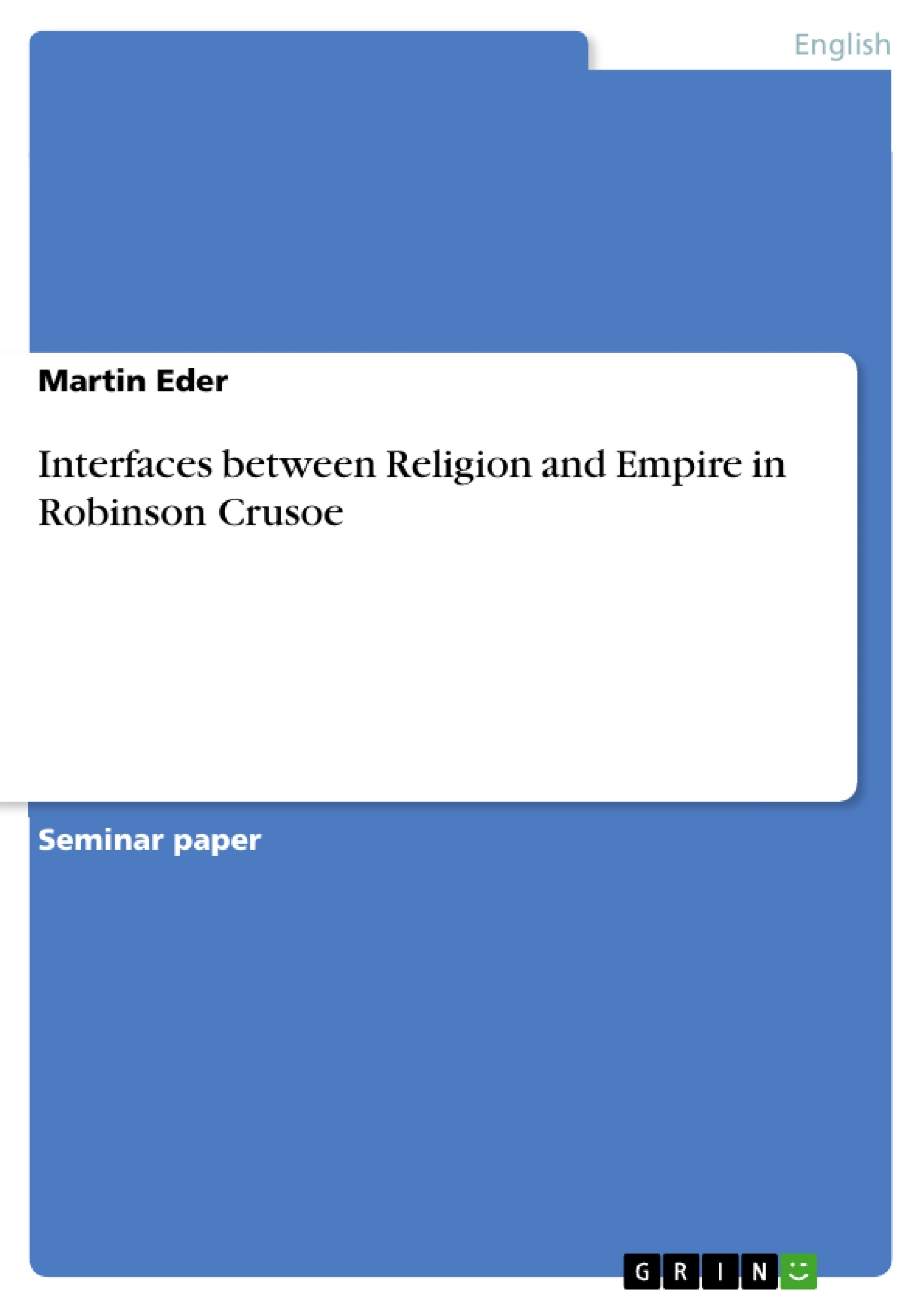This term paper deals with the representation of religion in general and especially the religious development of the protagonist in the novel Robinson Crusoe by Daniel Defoe. Therefore different phases of the relationship to God and religion will be illustrated and compared with in the following elaborations. Moreover, the role of religion within the Empire and the way it is represented in the medium of the novel is another aspect that will be discussed. The importance of the role of religion in the novel is, as many other aspects as well and the novel as a whole, not only considerable for the reader of Defoe’s time, but is also valid nowadays and therefore timeless.
As Robinson Crusoe is
“told […] with a religious application of events to the uses to which wise men always apply them, viz. to the instruction of others by this example, and to justify and honour the wisdom of Providence in all the variety of our circumstances, let them happen how they will” (Frick 1986: 109).
By creating the protagonist Robinson Crusoe, Defoe has managed to give the readership a character they can easily identify with, because Crusoe awakens interest in his adventures by just being himself. “But […] that interest does not arise because Crusoe’s life resembles those of his contemporaries, not because he is a typical private man. Rather, his life is one of ‘wonders’ unparalleled, ‘variety’ without precedent” (Richetti 1975: 24). The reason why Crusoe’s story is that much worthy for public notice is, that it “is, obviously, being sold as an extravaganza to people who like all of us value the exotic and the various as a pleasurable relief from the humdrum and uniform quality of daily life” (Richetti 1975: 24). To sum it up, Richetti mentions that Crusoe “lives in an uncommon common fashion” (1975: 24f) and as his daily life is made public to the reader as a typical private person it gains attractiveness as well as relevance. Among other things he succeeds in doing so by creating contraries while introducing private and already well-known activities into exciting and exceptional events (cf. Richetti 1975: 24f).
Inhaltsverzeichnis (Table of Contents)
- The role and the development of religion throughout the novel
- The initial situation concerning Robinson's religious attitude
- Robinson's religious development during the stay on the island
- First religious contacts
- Robinson's conversion
- The conversion of Friday
- Christian symbolism in Robinson Crusoe
- Colonialism, imperialism and the role of the novel
- Conclusion
Zielsetzung und Themenschwerpunkte (Objectives and Key Themes)
This paper examines the portrayal of religion, specifically the religious growth of the protagonist, in Daniel Defoe's novel Robinson Crusoe. It aims to explore various phases of Robinson's relationship with God and religion, comparing them with the context of the novel's time. Additionally, the paper will discuss the role of religion within the Empire and its representation in the novel. The paper emphasizes the significance of religion in the novel, both for readers of Defoe's time and for contemporary audiences, highlighting its timeless relevance.
- The role of religion in Robinson Crusoe's character development.
- The impact of Robinson's initial sin and its consequences on his journey.
- The influence of Puritanism and Biblical themes on the narrative.
- The connection between religion, colonialism, and imperialism in the novel.
- The exploration of religious symbolism and its significance within the story.
Zusammenfassung der Kapitel (Chapter Summaries)
The initial chapter focuses on Robinson's religious attitude at the beginning of the novel. The author analyzes Robinson's upbringing in a Puritan family and his early experiences with religion. The chapter also explores the biblical influences on the story, particularly the themes of disobedience, punishment, and redemption, as exemplified by the parable of the prodigal son. The chapter concludes by examining Robinson's decision to leave home and his subsequent feelings of guilt and remorse. The author highlights the connection between Robinson's initial sin and his subsequent adventures and misfortunes. The author explores the connection between religion, colonialism, and imperialism, analyzing the novel's representation of these themes. The author concludes the chapter by exploring the religious symbolism and its significance within the story.
Schlüsselwörter (Keywords)
The paper focuses on the interplay between religion and colonialism in Daniel Defoe's Robinson Crusoe. Key themes include religious development, Puritanism, biblical influence, colonial discourse, and the protagonist's moral journey. The analysis examines the role of religion in shaping Robinson's character and actions, as well as its broader implications within the context of the British Empire.
Frequently Asked Questions
How does Robinson Crusoe's relationship with religion evolve in the novel?
Crusoe starts with a rebellious attitude toward his Puritan upbringing. His stay on the island leads to a profound religious development, eventually resulting in his conversion and a deep reliance on Providence.
What role does Puritanism play in Daniel Defoe's work?
Puritanism provides the moral framework of the story, emphasizing themes like disobedience as a sin, divine punishment through misfortune, and the possibility of redemption.
Is there a connection between religion and colonialism in Robinson Crusoe?
Yes, the novel explores how religious mission and the expansion of the British Empire were intertwined, particularly through Crusoe’s efforts to convert Friday to Christianity.
What is the significance of the "prodigal son" theme in the story?
The biblical parable of the prodigal son mirrors Crusoe's journey: he leaves his father's house against advice, suffers for his disobedience, and eventually finds spiritual homecoming and repentance.
Why is the representation of religion in this 18th-century novel still relevant?
The novel addresses timeless questions about individual faith, moral growth, and how people interpret life's "wonders" and hardships as part of a larger spiritual journey.
- Quote paper
- Martin Eder (Author), 2011, Interfaces between Religion and Empire in Robinson Crusoe, Munich, GRIN Verlag, https://www.grin.com/document/281352



